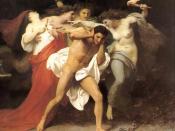"I'm always acutely aware of the Force behind - (Fate,
God, our biological past creating our present, whatever one
calls it - Mystery certainly) - and the eternal tragedy of Man
in his glorious, self-destructive struggle to make the Force
express him instead of being, as an animal is, an incident
in its expression. . . . This is the only subject worth writing
about and . . . it is possible - or can be - to develop a tragic
expression in terms of transfigured modern values and
symbols in the theater."
(Eugene O'Neill)
When Eugene O'Neill received the Nobel Prize in 1936, critics proclaimed him "a tragic dramatist with a great knack for old-fashioned melodrama." Not everyone shared this appreciation. In a letter, O'Neill noted his uneven critical reception, complaining of those who failed to see what he was trying to do. He struggled to create a new dramatic form for the American stage, one which transcended melodrama and achieved tragedy.
Although he has been a subject of controversy and many critics argued upon different issues concerning his life and career as a writer, O'Neill was definitely influenced by his own experience and knowledge. Even though his main writings seem elevated and objective, one can still sense the echoes of O'Neill's own life.
The author's main purpose was the knowledge of human psyche, the way in which social and historical environments influence the inner structure of the individual in general. Well known psychologists (such as Freud or Jung) and philosophers (such as Nietzsche) contributed to O'Neill's continuous research on the human soul and intellect. As a consequence of that, O'Neill managed to transmute human instincts and feelings from ancient history into the present. This is partly the goal he achieved in writing Mourning Becomes Electra.
What he experimented...


